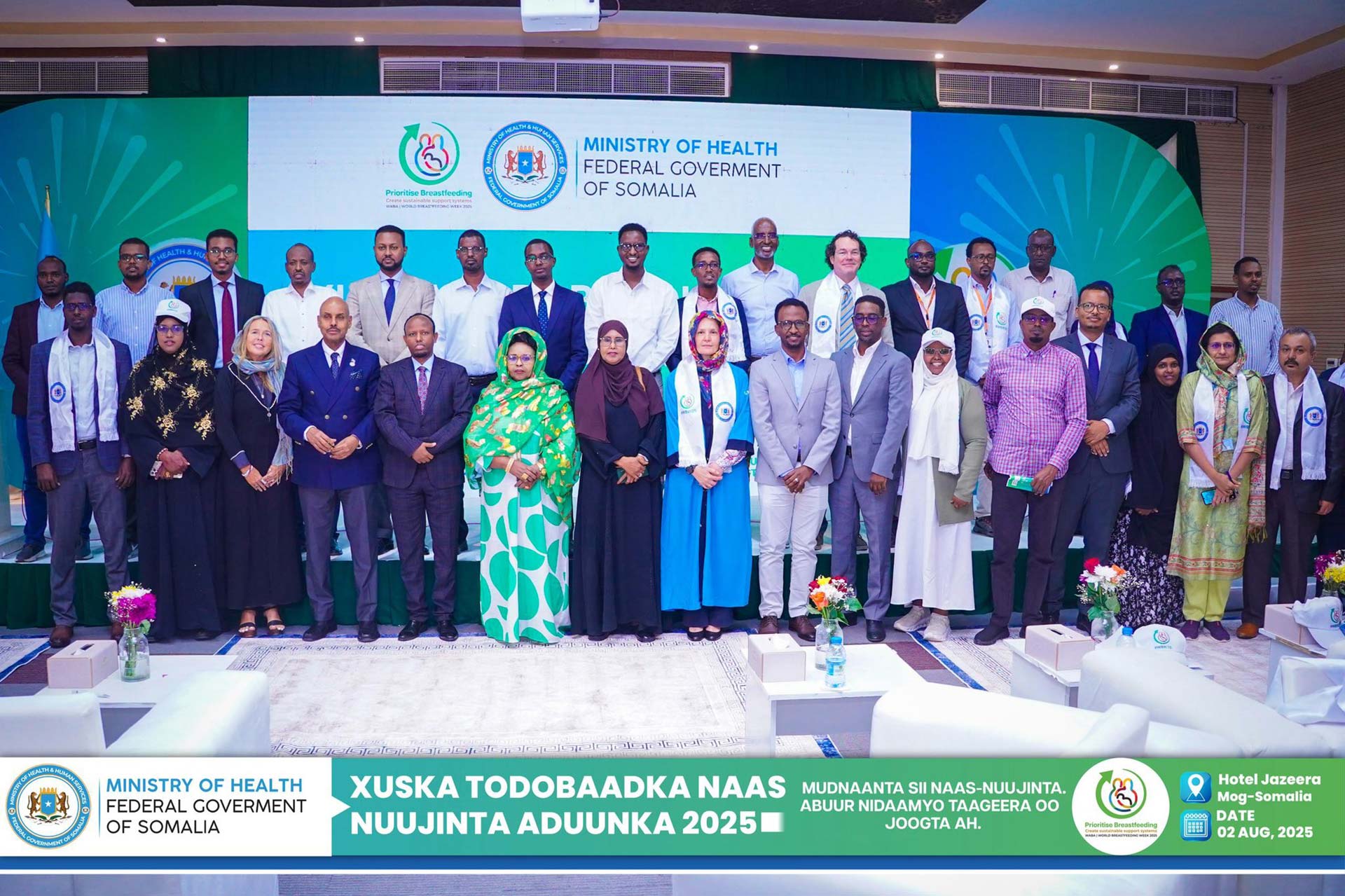3 August 2025, Mogadishu, Somalia – Somalia joins the rest of the world in marking World Breastfeeding Week, held annually from 1–7 August.
 This year’s theme, Prioritize Breastfeeding: Create Sustainable Support Systems, recognizes the barriers that breastfeeding mothers face – inadequate support, misinformation and systemic challenges that include a lack of paid time off from work to breastfeed, of parental leave after the baby is born, and inadequate protection from marketing of breastmilk substitutes – and calls on the government, the health system, workplaces and communities to build enduring, equitable frameworks that support breastfeeding mothers and empower families.
This year’s theme, Prioritize Breastfeeding: Create Sustainable Support Systems, recognizes the barriers that breastfeeding mothers face – inadequate support, misinformation and systemic challenges that include a lack of paid time off from work to breastfeed, of parental leave after the baby is born, and inadequate protection from marketing of breastmilk substitutes – and calls on the government, the health system, workplaces and communities to build enduring, equitable frameworks that support breastfeeding mothers and empower families.
Speaking at a commemorative event in Mogadishu this morning, Health Minister Dr Ali Haji Adam noted how breastfeeding delivers lifelong benefits, not just for children but for mothers, families and communities.
“The government is committed to creating sustainable support systems that protect, promote and enable breastfeeding across the country,” he said. “We will continue to implement policies that strengthen maternal health services, train frontline workers, raise awareness and ensure mothers have the support they need at home, in health facilities and the workplace. As we mark World Breastfeeding Week, we reaffirm our promise to build an environment where every mother feels empowered to give her child the healthiest possible start in life.”
“Breastfeeding is one of the most effective ways to give children a healthy start – improving cognitive development, strengthening immunity and protecting both infants and mothers from chronic diseases,” said World Health Organization (WHO) Somalia Deputy Representative Dr Kamil Mohamed. “But mothers cannot do it alone. We must create sustainable support systems through quality health services, family-friendly workplace policies and stronger legal protections against the unethical marketing of breastmilk substitutes.”
Breastfeeding is more than a feeding choice. Fully integrated across policies, health systems, workplaces and communities, it becomes a pillar of sustainable development.
“We owe it to babies, the future generation of citizens, and to ourselves to ensure that they have the best start in life through exclusive breastfeeding for 6 months and continued breastfeeding for up to 2 years,” said United Nations Children’s Fund (UNICEF) Representative Sandra Lattouf. “The benefits of breastfeeding outweigh any perceived negatives by a long mile. We need to ensure that every mother, her family and the child are supported throughout their breastfeeding journey with the knowledge, resources and encouragement they need. A healthy and thriving child is an asset for the family and nation.”
A sustainable breastfeeding system requires an all-of-society approach that ensures every mother has the support, environment and resources to breastfeed successfully, from conception through the first 2 years of the child’s life and beyond.
This year, World Breastfeeding Week aims to inform Somali citizens about their role in creating supportive and sustainable environments for breastfeeding. Key objectives include promoting family-friendly workplace policies such as paid maternity leave and breastfeeding breaks, empowering communities through peer support networks and culturally sensitive education and advocating for policies that protect breastfeeding from commercial influence and misinformation.
In Somalia, while 6 in 10 children are breastfed within an hour of birth, just 1 in 3 babies are exclusively breastfed for the first 6 months of life.
A major reason for the low rates of exclusive breastfeeding is the absence of legal measures against the unethical marketing of breastmilk substitutes, which are advertised as an alternative to breastfeeding. Somalia has made minimum progress in adopting the Code of Marketing of Breast Milk Substitutes which restricts the marketing of products intended to replace breastmilk, protecting mothers from commercial influence on their infant feeding choices.
Adoption of the Code of Marketing of Breast Milk Substitutes is part of Somalia’s obligations under the Convention on the Rights of the Child which it ratified in 2015. Renewed efforts are urgently needed to fully adopt the Code of Marketing and bring Somalia in line with countries that have a comprehensive and enforceable legal framework that protects babies and mothers from the marketing of breastmilk substitutes.
Media contacts:
Mohamed Osman, MoH Head of Communications, This e-mail address is being protected from spambots. You need JavaScript enabled to view it
Victor Chinyama, UNICEF Chief of Communication, This e-mail address is being protected from spambots. You need JavaScript enabled to view it
Khadar Hared, WHO Communication focal point, This e-mail address is being protected from spambots. You need JavaScript enabled to view it




